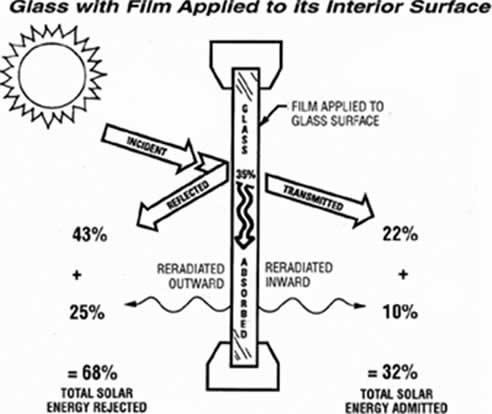Window film and energy - WFAANZ What is solar control film?
How does it work?
Solar film reduces the amount of visible light transmitted through glass, so reducing glare and increasing privacy. The reflective qualities of solar window film are well known and absorption rates are low.
How will I know what product to use to meet compliance?
What is the cost comparison?
Some old films looked ugly and at night you could not see outside. Has this problem been fixed?
What is the warranty on solar control window film?
What types of window film are there?
Clear film does not contain any metals to reflect solar radiation and is usually a Safety Film, offering safety protection and UV control to help reduce fading. Dyed film contains no metals and is considered non-reflective. This type of film provides glare and fade control and reduces heat gain by solar absorption. Metallised film has extremely thin layers of metals deposited directly onto the polyester film substrate. These films have tremendous solar control properties because they can reflect away significant amounts of solar radiation. The two basic manufacturing processes for metallised films are vapor coating and sputtering. Metallised film means that a metal is applied as a layer (coating) onto a clear polyester film, to which another layer of polyester film is laminated. These products are excellent solar control films capable of rejecting over 80% of all solar radiation. The thickness of the layers can be controlled, which results in films having varying levels of visible light transmission. In general the lower the visible light transmission (VLT), the higher the solar heat rejection. Sputtering is a versatile process as several layers of different metals can be applied to a single piece of film resulting in unique colors and higher levels of selective transmission. Sputtered films have excellent heat control properties. Generally, the most effective solar control films in terms of solar heat rejection are metallised films that have a low VLT in the 15 to 20 percent range, and a high heat rejection factor in the 70 to 80 percent region.
|
+61 2 9498 5241
|


 Random glass explosions prompt safety
Random glass explosions prompt safety Top 10 Window Film Hacks | WFAANZ
Top 10 Window Film Hacks | WFAANZ Window Film Advice for Home Owners |
Window Film Advice for Home Owners | Decorative Window Films | WFAANZ
Decorative Window Films | WFAANZ Window Film Assosciation Member TintFX
Window Film Assosciation Member TintFX Window Film Energy Saving Benefits Video
Window Film Energy Saving Benefits Video Star Ratings Make Window Film Selection
Star Ratings Make Window Film Selection Solar Control Window Film Environmental
Solar Control Window Film Environmental Window Film Prevents Electromagnetic
Window Film Prevents Electromagnetic Window Film and Commercial Building
Window Film and Commercial Building Window Tinting Solutions from WFAANZ
Window Tinting Solutions from WFAANZ WFAANZ window film - makeovers that make
WFAANZ window film - makeovers that make Accident proofing windows and doors with
Accident proofing windows and doors with Safety film to foil thieves by WFAANZ
Safety film to foil thieves by WFAANZ Nano-ceramic window film -
Nano-ceramic window film - Window Film Association of Australia and
Window Film Association of Australia and WFAANZ window-make over for Newtown
WFAANZ window-make over for Newtown A new web site for the Window Film
A new web site for the Window Film Window film saves Forty Winks stock -
Window film saves Forty Winks stock - Film saves energy at Collins Street -
Film saves energy at Collins Street -
